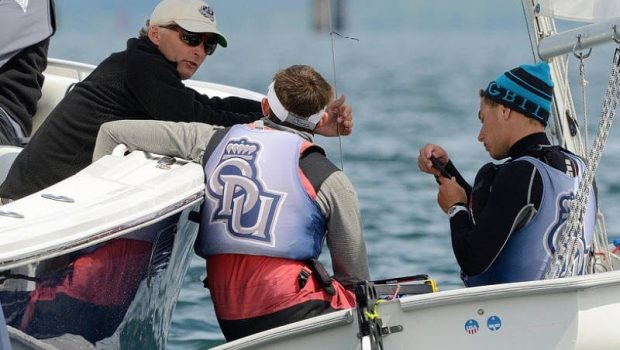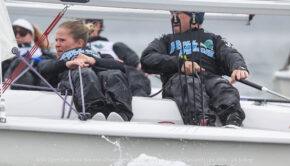College Sailing: Keeping the boat afloat
Published on March 12th, 2018
If you want to be successful, the basic game plan is always the same. While you always need to work smart, those that work harder and longer will find victory sooner. The commitment needed has gotten excessive, impacting what is now a much steeper climb to the podium.
College sports has not been immune, complicating what was intended for the student as a diversion from academics. Participating in college sports is now all consuming, arguably impacting the athletes ability to fully benefit from the curriculum and advancement opportunities.
Rules have been put in place to save everyone from themselves. Scuttlebutt editor Craig Leweck spoke with Mitch Brindley, President of Inter-Collegiate Sailing Association (ICSA), to better understand the landscape.
What can ICSA do to limit how much time a student-athlete trains or participates in the school sailing program?
Our rules mirror the daily and weekly practice and playing rules at the NCAA (click here).
Was there a tipping point that required these rules?
Not necessarily. We found the teams with varsity status were already following them as a requirement for the school, and we saw it as smart step to protect the student athletes. Also, a lot of what we’ve done in the last 15 years has been to put sailing into a box that makes a little more sense to people outside of our sport.
We already have a sport that takes up a whole lot of time. Our schedule covers both the fall and spring seasons. We sail boys and girls together. We compete in some places and take our boats and in some places we don’t. We have all these different national championships. Our course changes. Our sport is not easy to explain to someone that is a non-sailor.
This wasn’t a problem when competition within ICSA was all club teams with limited school support. The teams were student-run, practices sort of occurred, and the sailors were scratching for gas money and borrowing cars for regattas. But ICSA is now dominated by varsity programs, and when we started talking to athletic directors and compliance officers and university personnel, their eyes widened. “You practice how long? How much? All year? What? This is crazy.” Their heads were exploding.
To the extend at which schools are now involved, with coaches, trainers, tutors, and so on, everything got more sophisticated and ICSA needed to keep pace. We needed a greater framework and structure to operate within. And so, essentially that’s what our rules do. It gives us a little more structure, though a lot of people feel that it doesn’t go far enough.
When you compare the ICSA schedule to other collegiate sports, in terms of total number of competitions and total number of weekends, it dwarfs a lot of them. So we are working on that to reduce our season a little bit. While this may help to level the competitive playing field, we also see it allowing our sailors more free time to do other things that college students might want to do. Whether that is to integrate within campus or do some of their own sailing, perhaps an Olympic campaign or something else, this initiative opens that door.
With so many historic events, how do you reduce your schedule?
We reduce our schedule by making people make a choice. If you only have 22 weekends to participate, teams have to choose which events they are going to and when they are starting. And for the most part, everyone’s been able to do that.
A couple years ago we took the step to 20 weekends and are now preparing to reduce further to 18 weekends. We are discussing where the challenges lie are how to get all the qualifiers done for spring championships. It is complicated as school location and winter weather impacts the schedule, but we want to reduce the commitment outside of the national championship competitions.
However, it will ultimately be on the schools to decide when to use their weekends. When we go to 18 weekends for the 2018-19 academic year, schools will look at the entire calendar from the first regatta in the fall to the last one in the spring and circle which events they will go to.
This will be harder for schools that can sail that entire span, whereas schools dealing with winter hurdles might focus on the fall as often the cold weather and frozen venues can linger into the spring season.
Has there ever been talk of focusing only on the fall season? The Midwest conference struggles to get through the ice in the spring, and this would really open the door for students to do a semester abroad in the spring or pursue the Olympic events in Europe.
Oh yes, we’ve had conversations on just about everything. We’ve been trying to figure out a way to shorten our season more than it currently is, but we are challenged by what we have. There are five separate national championships and a racing calendar that includes the necessary qualifiers for these titles. If we moved everything into one season, we’d need to get rid of something altogether, and we’re just not at that point yet. Right now we see reducing the weekend count as a sustainable step in that direction.
So ICSA has the weekend count getting tighter, and already has limits on how much time the sailors can be on the water. Generally, as the rules get tighter, people tend to push against them. Is oversight a problem?
The biggest topics we have at our winter meetings is about rules and structure to combat the heightening level of competition. It was one thing when there were just a couple academies and private schools that had extensive programs, but college sailing is so much deeper now, and this does create issues as we do not have extensive oversight. We are relying on teams playing by the rules.
However, we hear the rumors. “How do we know so-and-so at sailor U isn’t practicing more than the allotted hours per week?” We don’t have an arm to investigate another school if they’re violating a rule. It comes down to essentially the executive committee to look into stuff like that.
Then there’s the issue with assistance. We have this rule that prohibits scholarships based on sailing ability and financial aid based on sailing ability. It is a simple rule that should be easy to follow and adjudicate, but it turns out it’s really not. It has gotten complicated as we have a hard time investigating even if someone says, “Well, I heard Johnny’s mom says that they were getting a scholarship to go to private school and I want to see how my son can get that?”
So we have to dig to learn what they are getting. Maybe it’s a leadership scholarships which our rules don’t cover. There have been many people that felt that there should be more rules in place, administrative rules in place, that will help keep the playing field even as much as possible.
But the reality is that the playing field will never be perfectly level. We’ve got a great disparity in our sport, in sailing, just like you do in any other athletic endeavor or any other part of sailing. Someone can afford a lot more in their J/70 campaign versus someone else. If you look at other college sports, there is immense disparity. College sailing is no different, but it remains a great outlet that more and more schools see value in. We just need to do our best to keep the train on the tracks.










 We’ll keep your information safe.
We’ll keep your information safe.